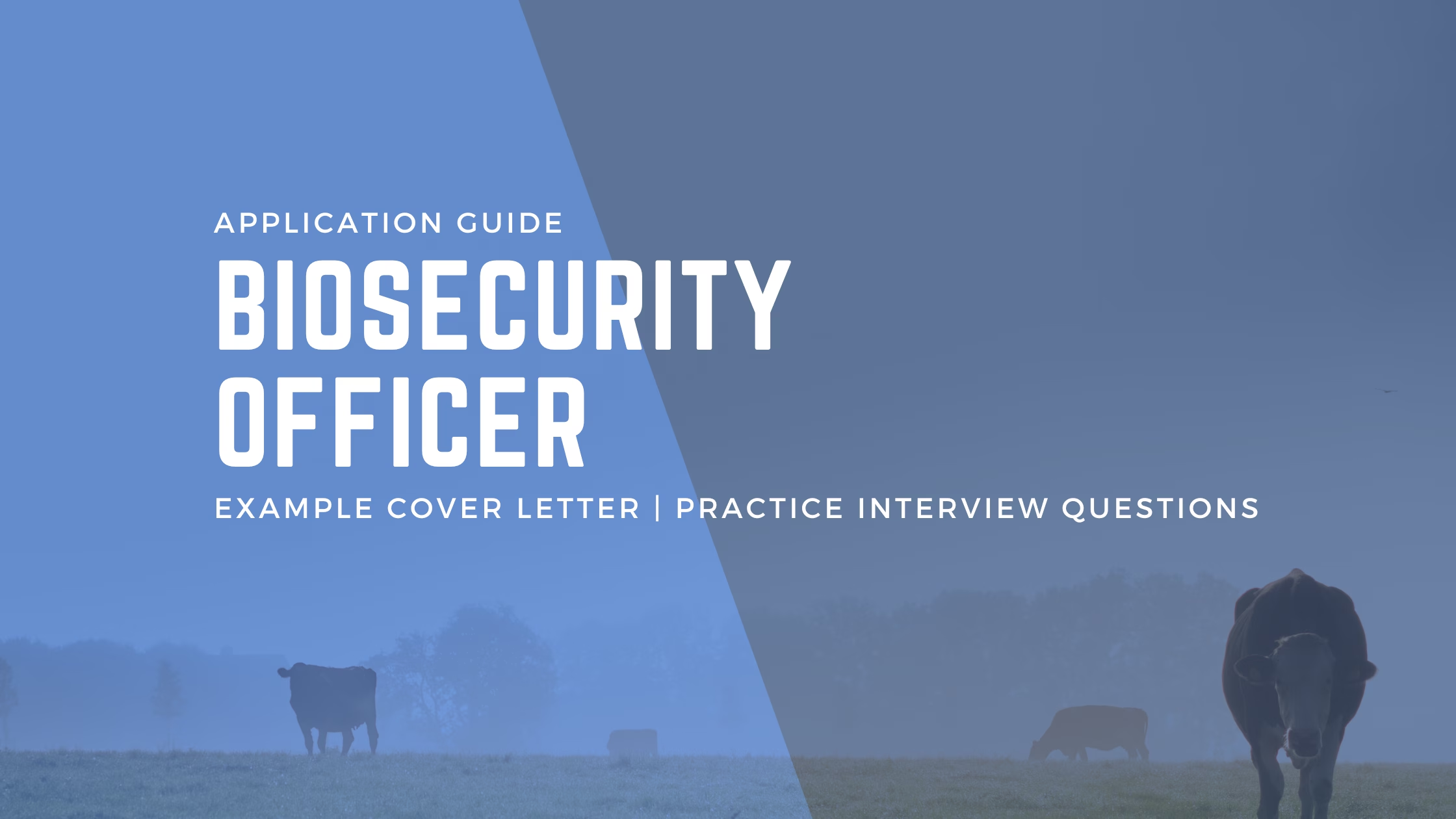The role of a Biosecurity Officer is a vital line of defence against agricultural threats and invasive species. By collaborating with local landholders, you’ll focus on pest animal and plant biosecurity, disease control, and regulatory compliance, ensuring that precious agricultural resources are safeguarded for future generations.
Working at Local Land Services (part of the Department of Primary Industries and Regional Development) offers you a front-row seat in pest animal control, plant health initiatives, and engagement with diverse stakeholders across regional NSW. If you have a passion for agricultural innovation, hands-on fieldwork, and the opportunity to make a tangible impact in local communities, this Biosecurity Officer position could be the perfect fit for you.
What makes this role particularly exciting is the chance to tackle evolving biosecurity challenges head-on—from wild dog containment to feral pig control—while shaping strategies that influence entire regions. You’ll protect farms and ecosystems, and gain invaluable government investigations experience in a role with significant scope for career growth.
If you’re new to public sector recruitment, check out this unofficial guide to NSW Public Sector recruitment for more insider tips and context.
Table of Contents
NSW Biosecurity Officer Pay and Job Summary
| Position Title | Biosecurity Officer |
| Organisation/Entity | Local Land Services / Department of Primary Industries and Regional Development (DPIRD) |
| Job Location | Narrabri, Moree, & Walgett (Regional NSW) Check Here For Current Vacancies |
| Work Type | Full-Time (ongoing) |
| Base Pay | Starting from $82,193 p.a + super |
| Closing Date | 27/03/2025 (11:55 PM) |
About the Biosecurity Officer opportunity
As a Biosecurity Officer, your primary responsibility is to protect local industries and environments by managing pest animals, plant biosecurity, and disease control measures. You will be part of Local Land Services (LLS), which operates under the broader Department of Primary Industries and Regional Development (DPIRD) in the NSW Public Sector. The goal is to ensure compliance with the Biosecurity Act and other regulations, while proactively guiding landholders and stakeholders toward best practices in pest control and sustainable agricultural production.
This role is focused on fieldwork and stakeholder engagement. You will frequently interact with landholders on topics like feral pigs, wild dogs, rabbits, and invasive plant species, all while remaining consistent with national and state-level biosecurity strategies. Whether you’re investigating new pest incursions or conducting disease control initiatives, you’ll help shape agricultural outcomes across multiple regions.
Challenges for Biosecurity Officers
Biosecurity Officers face several unique challenges. First, there’s the need for real-time responsiveness. Pest animal populations and outbreaks can be unpredictable, so acting swiftly and effectively is crucial. Second, maintaining compliance is essential. You’ll likely need to hold or be eligible for a firearms licence, and you must ensure you always stay within the bounds of the Biosecurity Act when applying restricted chemicals. Third, stakeholder engagement can be demanding. Communicating strategies to landholders with varying levels of experience, or working with different cultural and agricultural practices, requires strong interpersonal and negotiation skills.
Moreover, as part of the NSW Public Sector, you will operate within a framework of government investigations, meaning you must document incidents in a specific way and follow procedural rules. Finally, staying up to date on pests and diseases is no small feat, especially when dealing with invasive species that have significant impacts on local ecosystems.
Reasons To Apply For Biosecurity Officer Roles in NSW
One of the key perks of being a Biosecurity Officer is the potential for career growth in a field that directly supports regional communities. This role often serves as a stepping stone to more specialized or senior positions in compliance, research, and policy.
Now is a great time to apply, with multiple roles available in regional NSW.
Positions in Narrabri, Moree, and Walgett offer an authentic taste of country living, along with the satisfaction of addressing local pest animal and plant biosecurity challenges.
If you apply for this role, you may be placed in a talent pool, meaning you’ll be a qualified candidate when a position becomes available—either in these locations or across the state.
Another key benefit is flexibility. Local Land Services promotes a family-friendly culture and offers options like late starts or early finishes to support a healthier work-life balance.
Biosecurity Officer Application Requirements
Biosecurity Officer Application Process
To apply for the Biosecurity Officer role, you’ll need a strong cover letter (max. 2 pages) and a succinct CV (around 4 pages).
Your cover letter should clearly outline how your skills align with pest animal control, plant biosecurity, disease control, and stakeholder engagement. Refer back to the official job ad for specific instructions on how to apply.
Although there are no specific target questions mentioned for this role.
Essential Role Requirements
According to the job ad, candidates must be able to meet these requirements:
- Relevant qualifications in pesticide application (AQF3 & AQF4).
- Certificate IV in Government Investigations (or ability to complete it).
- Eligibility to hold a NSW firearms licence and certification for humane animal destruction, with the potential to be appointed as an Authorised Officer under the Biosecurity Act.
- A valid NSW Class C Driver’s Licence with a willingness to travel.
You will need to clearly included these essential role requirements in your cover letter.
Any background in pest and weed control, disease surveillance, or working with stakeholders on regional projects will give you a head start. Experience managing or participating in emergency responses—such as locust or bushfire scenarios—can also be a strong differentiator. Finally, an aptitude for record-keeping and the ability to operate in dynamic and sometimes fast-paced field settings will serve you well in this recruitment.
Understanding and Addressing Focus Capabilities
Before drafting your application, open the role description to review the focus capabilities required for Biosecurity Officer roles. These capabilities come from the NSW Capability Framework, which outlines the skills and behaviours needed for success in the public sector. By aligning your cover letter and resume with these focus capabilities, you’ll show the recruitment panel that you’re equipped to excel.
Biosecurity Officer Application Checklist
| Checklist item | Completed |
|---|---|
| Confirm you meet the essential role requirements (qualifications, licences) | |
| Prepare a tailored CV (approx. 4 pages) | |
| Draft a two page cover letter (you can use this free template) | |
| Get your cover letter reviewed (only $29) |
Candidate Profile
Meet Alex, a passionate agricultural science graduate who has spent the past two years working on a farm in Northern NSW. Alex has hands-on experience in feral pig monitoring and weed management, but wants to take the next step in a formal public sector recruitment pathway. Motivated by a desire to protect local ecosystems, Alex is ready to prepare a well-structured cover letter highlighting both practical field skills and experience in stakeholder engagement.
Having heard about the Biosecurity Officer opportunities in Narrabri, Moree, and Walgett, Alex sees this as a perfect chance to blend environmental stewardship with broader compliance responsibilities.
Check out the government cover letter below for Alex. You can get more help with your own cover letter in this free guide.
Example Cover Letter for Biosecurity Officer
Dear Hiring Manager,
I am writing to apply for the Biosecurity Officer position with Local Land Services at Walgett.
As an Agricultural Science graduate with two years of hands-on experience on a farm in Northern NSW, I have developed practical expertise in feral pig monitoring, weed management, and stakeholder engagement. My ultimate goal is to use these skills and experiences to protect local ecosystems while contributing to the success of the public sector in a broader compliance and community-focused role.
Over the past two years, I have consistently sought out opportunities to demonstrate accountability, act with integrity, and collaborate effectively to achieve tangible outcomes for both private landowners and local communities. Two specific experiences stand out as clear examples of these capabilities, illustrating my readiness to take on the responsibilities of a Biosecurity Officer.
During my first year on the farm, we identified a significant feral pig incursion that threatened nearby crops, livestock, and natural habitats. The situation was urgent: feral pigs were causing substantial damage to crops, while also posing a biosecurity risk to neighbouring properties. My task involved taking immediate ownership of the response plan, ensuring that all activities were compliant with our safety protocols and aligned with local regulations.
To address this challenge, I acted by initiating a systematic approach that included mapping out the areas of greatest pig activity, setting up monitoring stations, and engaging local landowners to share data on pig sightings. I maintained clear channels of communication with farm management to ensure any budgetary considerations were addressed and followed procurement procedures when sourcing materials such as traps. Additionally, I stayed vigilant about safe work practices, leading regular checks to confirm everyone was adhering to the relevant guidelines for trapping and handling animals. Whenever there was a potential risk, I escalated it promptly to management, maintaining a transparent and accountable work environment.
The result of this coordinated effort was a 40% reduction in feral pig activity within three months, mitigating crop losses and strengthening relationships with surrounding properties. Equally important, this project reinforced the value of accountability in achieving meaningful outcomes. By taking ownership of the process, managing resources responsibly, and proactively communicating with stakeholders, I was able to deliver results that protected both agricultural interests and the local ecosystem.
Another pivotal experience occurred when a sudden outbreak of a highly invasive noxious weed threatened one of the farm’s most profitable crop fields. The situation demanded an immediate solution, as the weed infestation could have led to significant financial losses and potential spread to neighbouring properties. My task was to ensure a swift, compliant approach to eradicating the weed while adhering to the farm’s procurement policies, safe handling practices, and environmental regulations.
I acted by conducting a thorough evaluation of multiple herbicide suppliers, comparing their products based on efficacy, environmental impact, and cost. Following the farm’s procurement guidelines, I sought quotes from at least three reputable suppliers and verified their compliance with local and state regulations. Once the herbicides were secured, I coordinated with an external contractor skilled in weed management to apply the chemicals safely and within the required timeline. Throughout the process, I provided regular updates to the farm owner, ensuring a positive, customer-focused experience and demonstrating transparency in how resources were being used.
The result was that we successfully contained and eradicated the weed infestation ahead of schedule, preventing crop damage and avoiding further spread to neighbouring farms. This effort exemplified not only my proficiency in procurement and contract management, but also my commitment to customer service—ensuring the farm owner remained informed and satisfied at every stage. The outcome also strengthened my belief in proactive communication as a vital component of effective project management.
Beyond these successes, my experiences have consistently reinforced the importance of collaboration, ethical conduct, and continuous learning. From working with regional stakeholders to prioritising safe work practices, I have cultivated a mindset that aligns with public sector values—acting with integrity, seeking to deliver positive results, and ensuring community well-being remains at the forefront of every decision.
I am confident that my combination of practical field expertise, passion for environmental stewardship, and dedication to professional integrity will make me a strong candidate for the Biosecurity Officer role.
Thank you for considering my application. I look forward to the opportunity to further discuss how my experiences can contribute to the ongoing success of your team.
Sincerely,
Alex
Explain the STAR Technique
The STAR technique is a structured approach used in cover letters and interviews within the NSW Public Sector to clearly demonstrate how you’ve handled challenges in previous roles. It stands for Situation, Task, Action, and Result:
- Situation: Provide context or background for the scenario.
- Task: Describe your specific goal or responsibility in that situation.
- Action: Outline the steps you took to address the task.
- Result: Summarize the outcome, emphasising measurable achievements or improvements.
In the Biosecurity Officer cover letter example, you can see how STAR illustrates concrete actions and tangible results that are aligned to this role’s focus capabilities. This approach is useful in public sector recruitment because it allows hiring teams to see how your experience meets the focus capabilities that are needed for the role. When tailoring your own cover letter, consider weaving in at least one or two STAR examples that reflect your unique experience.
How to Prepare for a Public Sector Interview
Public sector interviews in the NSW Public Sector often focus on how well you demonstrate key capabilities aligned with the NSW Capability Framework. You’ll want to highlight examples that showcase your adaptability, teamwork, and compliance knowledge. Below are five steps to stand out:
- Review the Focus Capabilities: Open the role description to identify which capabilities matter most for Biosecurity Officer positions.
- Brainstorm Examples: Think of real-life situations where you used these capabilities, especially in pest or weed management, stakeholder engagement, or government investigations.
- Match to Indicators: Ensure your examples align with the specific behavioural indicators (e.g., Demonstrate a thorough knowledge of the services provided and relay this knowledge to customers.
- Use the STAR Method: Structure your responses as Situation, Task, Action, and Result to be clear and concise.
- Practise & Use Notes: If allowed, bring a brief outline of your examples; if not, rehearse thoroughly so you can speak confidently without prompts.
Three possible interview questions for a Biosecurity Officer role might include:
- Describe a situation where you recognised potential misconduct or inappropriate behaviour in your workplace. How did you respond, and what steps did you take to maintain a culture of integrity?
- Can you tell me about a time you identified a gap in customer service processes? What did you do to address it, and how did your solution impact the overall customer experience?
- Describe a situation where you needed to coordinate with colleagues from different teams to achieve a goal. How did you share information and maintain a supportive, cooperative environment?
To respond to the questions, use the STAR format. For example:
Situation: While working in a regional biosecurity unit, I noticed repeated calls from local landholders asking for basic guidance on identifying invasive weeds. This indicated a gap in our customer service process: people lacked quick, clear information on proper weed identification.
Task: I aimed to streamline our support so landholders could easily identify invasive weeds and take appropriate steps without multiple back-and-forth calls.
Action: I worked with local agronomists to create a simple reference guide featuring photos of common invasive weeds, updated the department’s website with these visuals, and introduced a dedicated phone line to answer urgent questions.
Result: Over the next two months, weed-identification calls decreased significantly, and early detection reports increased. This allowed for faster containment measures and improved the overall experience for landholders seeking our help.
Need more help? Download our public sector interview questions and answers workbook for additional insights and examples.
Time To Start Your Application
Ready to embark on your next career step? Click here to apply for the Biosecurity Officer role and start shaping a safer future for regional NSW. Throughout the recruitment process, remember to customise your application to highlight how to apply your unique experiences in pest management, stakeholder engagement, and compliance.
Don’t forget: getting your cover letter reviewed is the easiest and most affordable way to significantly improve your application’s success. Click here to get your cover letter reviewed for only $29. This small investment can offer you a huge advantage in the highly competitive realm of public sector recruitment.





